
ARTIFICIAL INTELLIGENCE
SPRING 2024 PUBLISHED BY THE USC MANN SCHOOL OF PHARMACY AND PHARMACEUTICAL SCIENCES
EDITOR IN CHIEF
Michele Keller
MANAGING EDITOR
Susan L. Wampler
CONTRIBUTING WRITERS
Dora Dalton
Stephanie Hedt
Christian Hetrick
Lance Ignon
Jinny Kim
Jenesse Miller
Stan Wedeking
David Zong
DESIGN
Warren Group | Studio Deluxe PHOTOGRAPHY
Ed Carreon
Kelsey Hale
Isaac Mora
Reynaldo Obrero
David Zong
COVER ILLUSTRATION
Greg Mably
© 2024 BY THE UNIVERSITY OF SOUTHERN CALIFORNIA MANN SCHOOL
Letters to the editor, questions, comments, address changes, requests to be added/ removed from the mailing list and all other inquiries should be addressed to:
Michele Keller
Chief Communications Officer
USC Mann School of Pharmacy and Pharmaceutical Sciences
1985 Zonal Avenue – PSC 700 Los Angeles CA 90089-9121
kellermi@usc.edu
323-442-3497
MANN.USC.EDU
DEAN
Vassilios Papadopoulos, DPharm, PhD, DSc (hon)
BOARD OF COUNCILORS
David Neu, Chair
Edward Abrahamian
Anil “Neil” Badlani
Melvin F. Baron
Gale Bensussen
Penny Cai
Danielle C. Colayco
Daniel Gil
Debrina Johnson
Dong Koo (D. K.) Kim
Dianne Kwock
Ann Young Lee
Vinson Lee
Sohail Masood
David Meek
Kimberly Moore
Shushma Patel
Chao Peng
William Pih
Robert Popovian
Denis Portaro
Raymond Risman
Jacque J. Sokolov
Khanh-Long (Ken) Thai
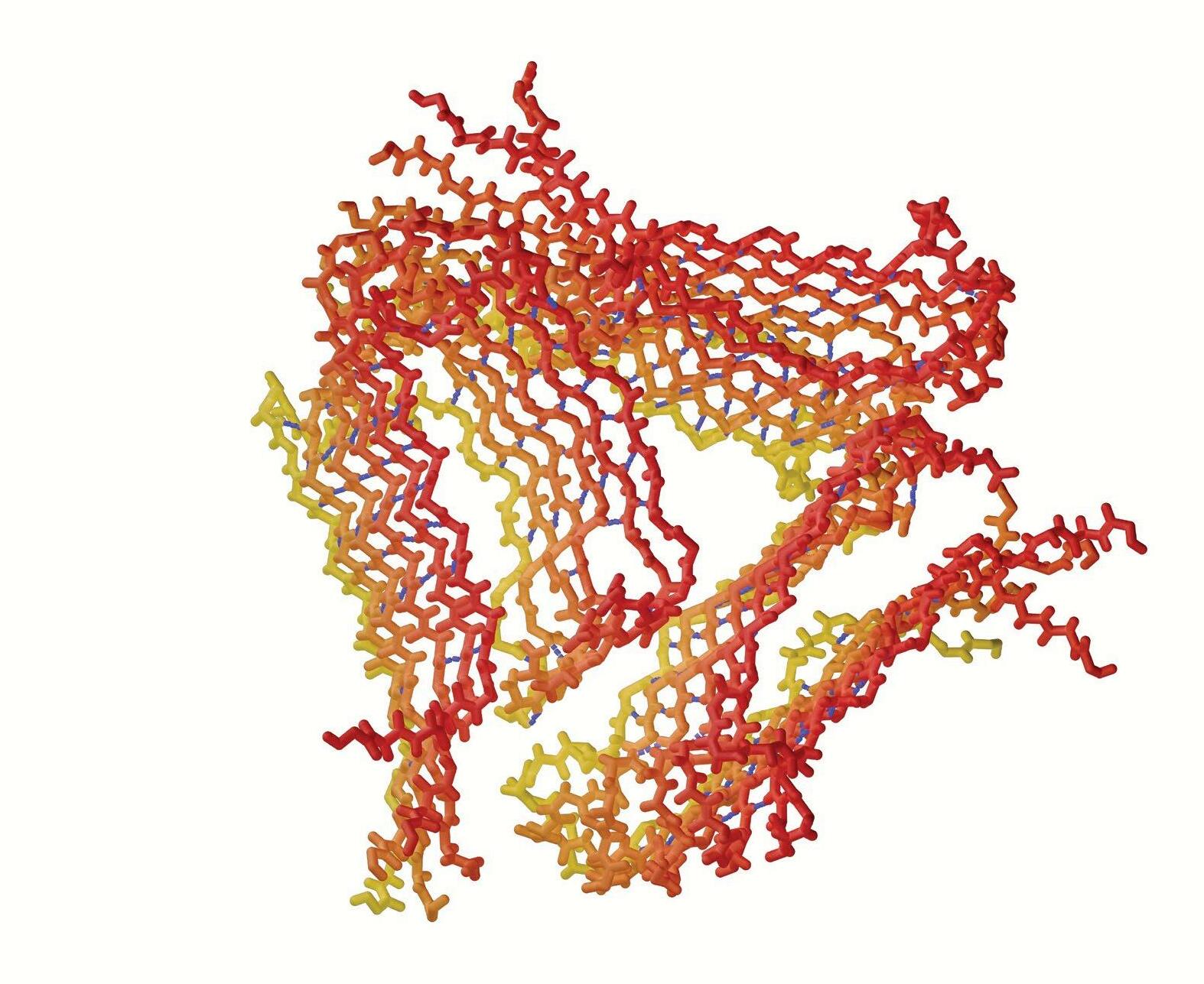
Kelly Wilder
William A. Heeres, Chair Emeritus
One of the top pharmacy schools nationwide and the highest-ranked private school, the USC Mann School continues its century-long reputation for innovative programming, practice and collaboration. Founded in 1905 as the USC College of Pharmacy, the school was known as the USC School of Pharmacy from the mid-20th century until 2022, when it received a $50 million endowment and was renamed on behalf of inventor and entrepreneur Alfred E. Mann.
The school created the nation’s first Doctor of Pharmacy program, the first clinical pharmacy program, the first clinical clerkships, the first doctorates in pharmaceutical economics and regulatory science, and the first PharmD/MBA dual-degree program,
among other innovations in education, research and practice. The USC Mann School is the only private pharmacy school on a major health sciences campus, which facilitates partnerships with other health professionals as well as new breakthroughs in care. Uniquely it owns and operates three pharmacies with plans to open a fourth location in South Los Angeles in the coming year.
The school is home to the D. K. Kim International Center for Regulatory Science at USC, the Titus Center for Medication Safety and Population Health, and the Center for Quantitative Drug and Disease Modeling, and is a partner in the USC Leonard D. Schaeffer Center for Health Policy & Economics, the USC Institute for
Addiction Science, the USC Ginsburg Institute for Biomedical Therapeutics, the Southern California Clinical and Translational Science Institute, the USC Center for Neuronal Longevity, and the USC Center for Drug Discovery, Delivery and Development. The Mann School pioneered a national model of clinical pharmacy care through work in safety-net clinics throughout Southern California and is a leader in comprehensive medication management.
Results magazine, published semi-annually, highlights some of the school’s latest advances and achievements, as well as the faculty, students, alumni and donors who make this work possible.
THE USC MANN SCHOOL OF PHARMACY AND PHARMACEUTICAL SCIENCES
ABOUT
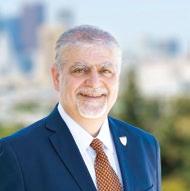
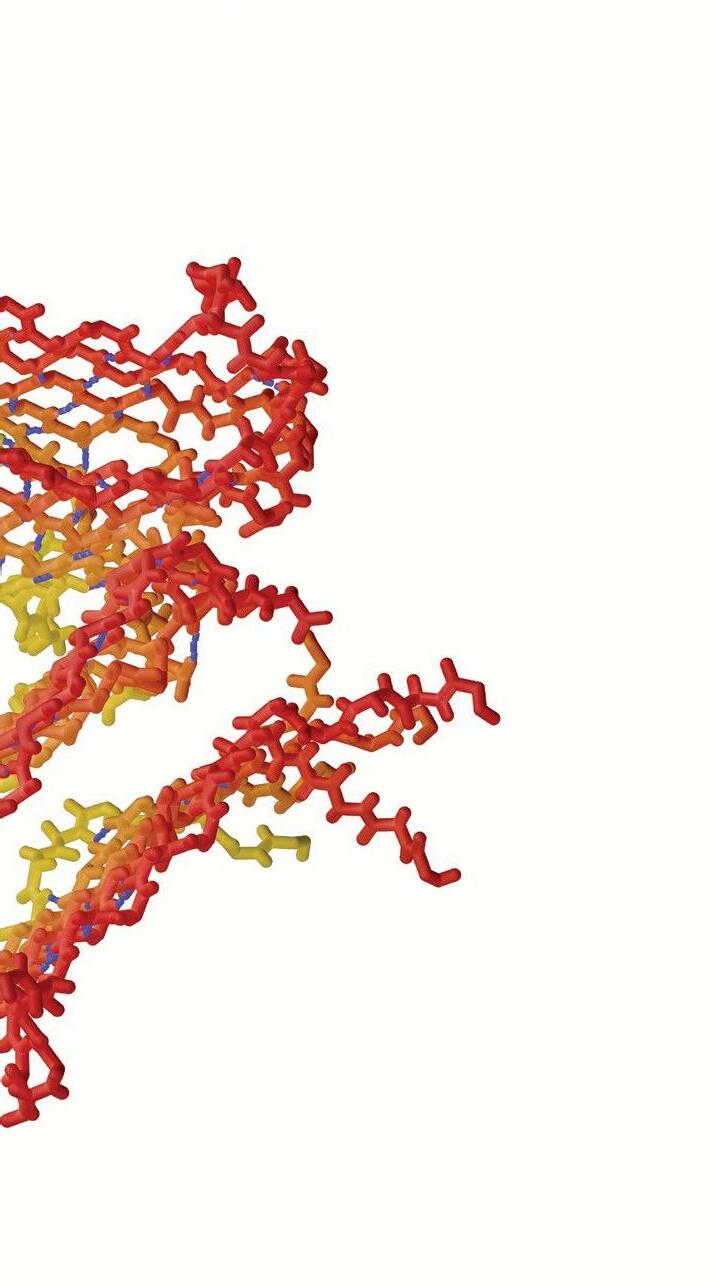
Healthy Intelligence
A year ago this April, the Mann School held a faculty retreat focusing on how to best apply artificial intelligence (AI) in transforming research, education and healthcare itself. We discussed multiple aspects of AI’s ever-increasing importance in areas including biomedical research, drug discovery, health outcomes and, of course, the success of our students.
Those topics are spotlighted in this issue, as we share how USC is harnessing AI to strengthen education, research and practice across a wide spectrum of important areas. Already, in our own fields, this revolutionary technology is becoming crucial to drug discovery and manufacturing, shaving years off of the early research and development phase while improving efficiencies in the production of approved pharmaceuticals. In the future, such benefits will continue to accrue while further advances will enable scientists to use ever more precise data analytics to uncover new knowledge and ensure both safety and effectiveness.
In looking ahead, I find myself reflecting on the extraordinary pace of discovery in my own lifetime. I had barely heard of DNA when I was studying biology in high school—rapid DNA sequencing techniques were just beginning and the Human Genome Project was still a decade away—yet today both are pivotal to medical innovation. Likewise, I grew up using payphones to call home, while today’s smartphones can connect us by video to our healthcare providers, keep track of our healthcare records, and monitor our steps and heart rates, among so many other things.
We are still at the dawn of AI’s potential. In our cover story, you will see firsthand accounts about its use in our fields as well as perspectives on what the future may bring.
This issue also features Ian Haworth, an expert in computer-simulated drug design who is leveraging AI to enhance and ensure student success. In addition, you will read about QSAD Centurion—the Mann School’s premier support group— and work they are doing to ensure our school is positioned to excel. We also highlight our students’ involvement in community outreach initiatives including new pharmacy vending machines and an innovative naloxone distribution program. And then there is the inspiring story of this year’s Krown Fellowship awardee, along with updates on funding won by our dynamic faculty for leading-edge research.
Our faculty, graduates and staff have always embraced new approaches and tools—and often helped create them. AI is no exception. We at the Mann School, working with colleagues across USC and around the world, are committed to optimizing the technology’s capabilities while maintaining strict ethics in its use.
The potential is endless. Because pharmacy and the pharmaceutical sciences are ultimately about making life better, and our sense of humanity will always be essential to that cause.
Thank you for your support as we apply the advantages of AI to improving health and preparing students for success in ethically using this rapidly evolving technology.
 Vassilios Papadopoulos, DPharm, PhD, DSc (hon) Dean, USC Mann School
John Stauffer Decanal Chair in Pharmaceutical Sciences
Vassilios Papadopoulos, DPharm, PhD, DSc (hon) Dean, USC Mann School
John Stauffer Decanal Chair in Pharmaceutical Sciences
Molecular model of human brain-derived beta-amyloid fibrils isolated from a patient with Alzheimer’s disease. These insoluble fibers resist degradation and build up in brain tissue, forming the amyloid plaques found in the brains of Alzheimer’s disease patients. With a family history of neurodegenerative disorders, PhD student Brandon Ebright is pursuing new and more effective therapies (see story, page 29).
1 RESULTS SPRING 2024
4 / AP REPORT SPOTLIGHTS USC OBESITY RESEARCH
6 / IAN HAWORTH: BALANCED CHEMISTRY
8 / MINI-PHARMACY IN A VENDING MACHINE
8 / MACKAY ELECTED TO NATIONAL ACADEMY OF INVENTORS
8 / RAO RECEIVES NATIONAL EARLY INVESTIGATOR AWARD
9 / NIH RENEWS $3M GRANT FOR MACKAY AND HAMM-ALVAREZ
9 / CRMC NAMED INAUGURAL RECIPIENT OF HYPERTENSION HERO AWARD
10 / DEMENTIA DIAGNOSES RISE WITH RISK ADJUSTMENT
11 / NEW SCHAEFFER INSTITUTE LAUNCHED IN NATION’S CAPITAL
Story
12 / ABUNDANT INNOVATION: HOW ARTIFICIAL INTELLIGENCE IS CHANGING THE FIELD
20 / QSAD CENTURION: DECADES OF LEADERSHIP AND SUPPORT Alumni
22 / BEST OF THE BEST: ALUMNA JAN MARIE SALCIDO HONORED
23 / RECOGNIZING 2024 ALUMNI AWARDS RECIPIENTS
24 / CLASS NOTES
26 / PADULA WINS 2023 FRONTIER AWARD
26 / CAMARERO EARNS AMERICAN CANCER SOCIETY GRANT
27 / QATO AWARDED GRANT TO ADDRESS OPIOID-USE DISORDERS
27 / WONG-BERINGER RECEIVES MERCK GRANT
27 / NEW FACE: JEANY KIM JUN
28 / STOPPING OPIOID OVERDOSE DEATHS
28 / ADVANCING STUDENT SUCCESS AND WELL-BEING
29 / KROWN FELLOWSHIP WINNER INSPIRED BY FAMILY HISTORY
30 / STUDENT SPOTLIGHT: TONY YU
31 / CELEBRATING BLACK HISTORY MONTH
31 / NEW COURSE CHARTS VACCINES AND BIOLOGICS DEVELOPMENT
32 / PHOTO SHOP
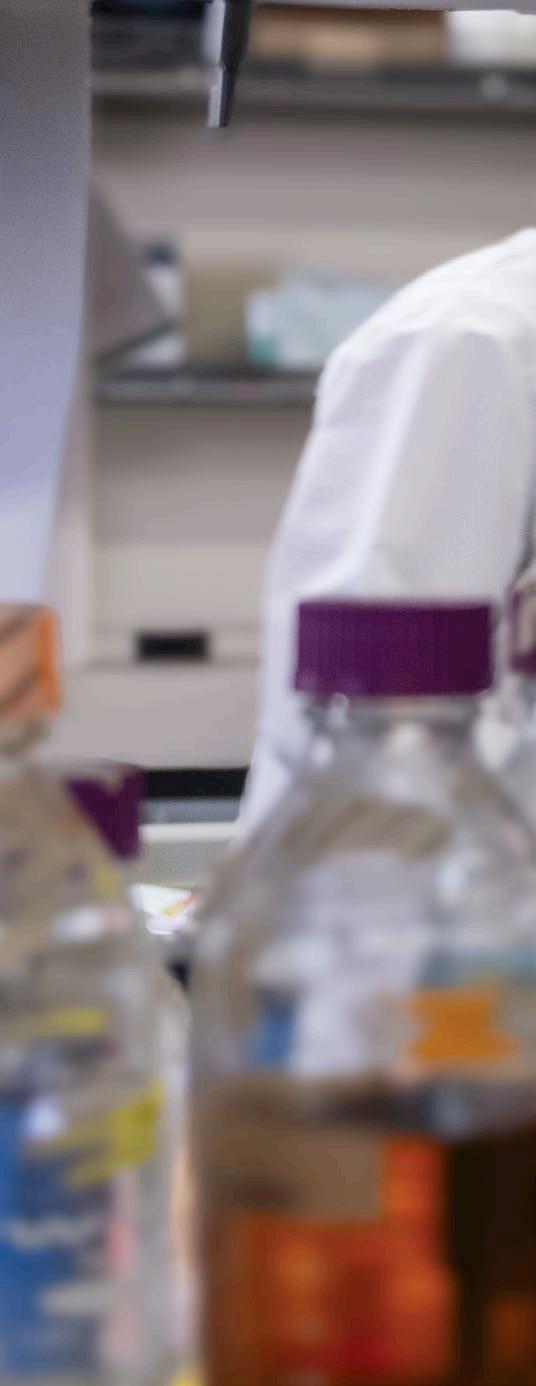
2 USC MANN SCHOOL Contents
Spectrum
Broad
Cover
Giving
Faculty
Students
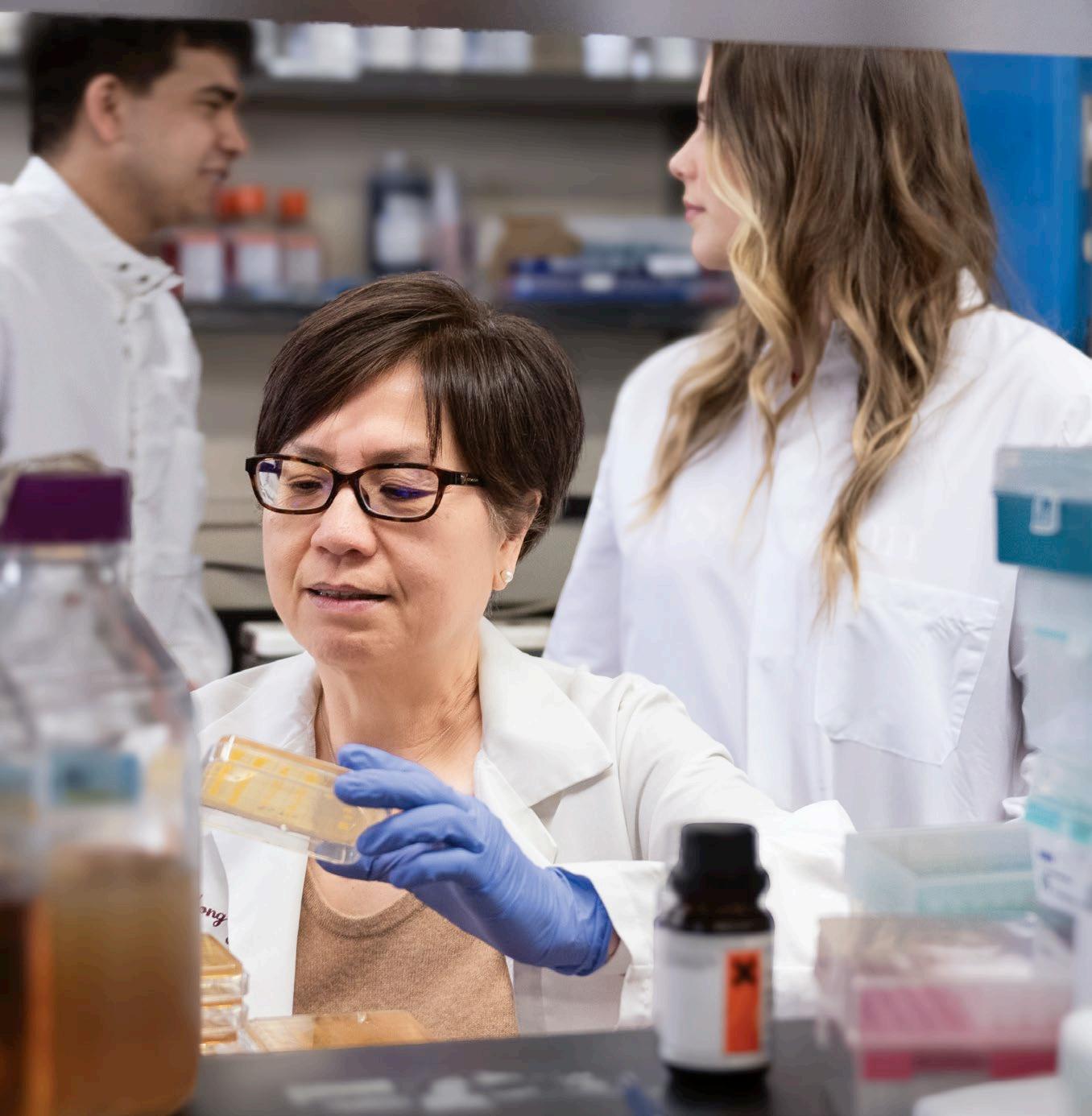
3 RESULTS SPRING 2024
Annie Wong-Beringer, associate dean for research affairs, is exploring new strategies to limit the emergence of antibiotic resistance (see page 27). She convened the USC Mann faculty retreat last year on artificial intelligence (see page 12).

4 USC MANN SCHOOL BROAD SPECTRUM
AP REPORT
Obesity ranks as one of our most urgent healthcare issues, yet only affordability stops it from being among the most easily treated. Recent Associated Press (AP) reportage got the word out about the issue by citing a white paper co-written by Darius Lakdawalla on the need to let Medicare cover anti-obesity drugs. The story has also been picked up nationwide by PBS and other news outlets.
Saving lives and money
Published by the Schaeffer Center for Health Policy & Economics, the analysis demonstrates that changing the current prohibition against such coverage would save federal taxpayers up to $245 billion over a decade. In addition to serving as Quintiles Chair in Pharmaceutical Development and Regulatory Innovation at USC Mann, Lakdawalla is director of research for the Schaeffer Center, a partnership between the Mann School and the USC Price School of Public Policy.
Several weight-loss therapies are now on the market that have been approved by the Food and Drug Administration. Yet federal law currently restricts Medicare coverage of these proven treatments to just 1% of Americans—even though obesity is a leading risk factor for mortality.
“We looked at the long-term health consequences of treating obesity in the Medicare population,” Lakdawalla told the AP. The study also found that the social benefits would be enormous, equaling nearly $100 billion per year. More importantly, the policy change
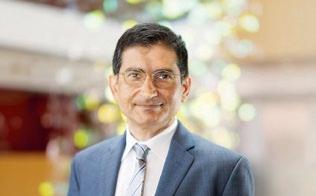
would enhance health and save lives, since most of the savings would come from the reduced need for hospitalizations and other care for obesity-related conditions. Private-sector insurees would benefit as well, as companies invariably follow Medicare’s lead.
Unlocking value
The researchers estimated these savings by using the Schaeffer Center’s Future Adult Model (FAM), a microsimulation combining data from numerous nationwide surveys to forecast lifetime health, medical spending, social service use and economic outcomes.
Lakdawalla also joined with Schaeffer Center colleagues in writing a comment letter about the issue that was submitted to the Congressional Budget Office. “Our modeling shows that new treatments generate substantial benefits to Medicare and its beneficiaries,” Lakdawalla says. “Developing strategies for unlocking that value should be a priority for policymakers.”
To address federal cost concerns, he and colleagues suggest a three-part pricing approach that starts with relatively low pricing. The more effective a drug is shown to be, the more its price would increase. As patents expire and generic versions enter the market, the expense would come down again.
It’s unfortunate that you have to be a pretty astute consumer and patient these days to navigate the [prescription drug] system. There may be other options by talking to your doctor [who may be able to] substitute a lowercost product.”
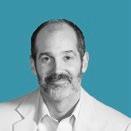
Geoffrey Joyce—chair of the Mann School’s Department of Pharmaceutical and Health Economics, and director of health policy at the USC Schaeffer Center—in a January 21 article in USA Today about how to shop around to reduce prescription drug costs $ 245B
SAVINGS OVER A DECADE
Informed by Schaeffer Center studies, Representatives Brad Wenstrup (R-Ohio) and Raul Ruiz (D-Calif.) have introduced legislation to allow Medicare to pay for obesity treatments—nutritionists and dietitians as well as medications.
5 RESULTS SPRING 2024
SPOTLIGHTS USC OBESITY RESEARCH
IF MEDICARE COVERED ANTI-OBESITY DRUGS
Darius Lakdawalla
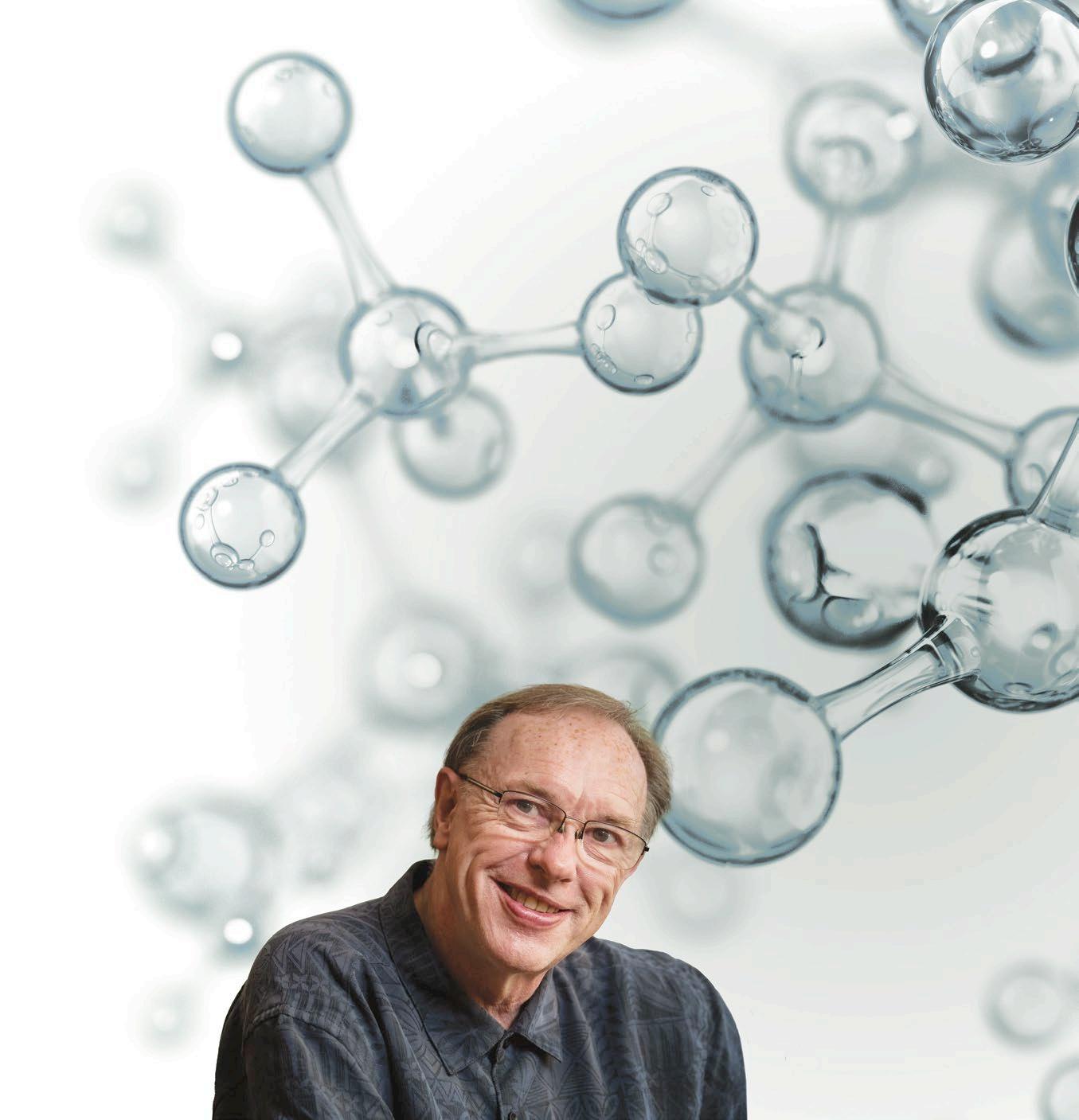
6 USC MANN SCHOOL BROAD SPECTRUM

Balanced Chemistry
Ian Haworth, vice chair of USC Mann’s Department of Pharmacology and Pharmaceutical Sciences, is an expert on drug design through computer simulation. His research combines chemistry, biology and the computational sciences, while also leveraging artificial intelligence (AI) to enhance education and ensure student success. Here, he discusses what drives his teaching and research.
What sparked your passion for the pharmaceutical sciences?
Growing up in Blackpool in northwest England, I got a chemistry set for Christmas when I was 11. I also had a teacher who showed us lots of experiments. One that blew me away was mixing iron fillings with a pile of sulfur, which made a black and yellow mess. Then he showed us some iron sulfide, which looked like the same dirty mess. He put a magnet to the first pile, and the iron separated from the sulfur. But nothing happened when he applied that magnet to the iron sulfide, and he explained that was because of the chemical bond. I couldn’t believe how exciting chemistry was, and I’ve been interested in chemical bonding ever since.
What drew you to the intersection of chemistry and computing?
While earning my PhD at the University of Liverpool, I realized you could bring computation to bear in understanding molecular events. That was in the late 1980s when, if you wanted to use code for processing data, you had to write it yourself. I was fortunate to do my postdoc at Oxford in physical chemistry/ computational biochemistry under Graham Richards, then chair of the Department of Chemistry. In addition to teaching the science, he showed me the importance of communicating and doing something with that scientific knowledge. In my case, that now includes physiologically based pharmacokinetic modeling to simulate how a drug distributes in the body.
You collaborated with Assistant Dean for Assessment Maryann Wu and Director of Professional Experience Programs Ying Wang on an AI model to predict student success—work that’s won top poster honors at two national conferences. Can you tell us more?
A former PhD student of mine introduced me to the general AI platform KNIME, which I started applying to chemistry and molecular design. Then Maryann and I began using it to evaluate student data. Ying has contributed hugely to this as we started looking not just at the didactic curriculum but also experiential education. Our work has resulted in a number of important realizations, including data showing which order of Advanced Pharmacy Practice Experiences relates to greater success.
You co-direct USC Mann’s popular summer programs, which draw students from around the world. Why are global exchanges like these so important?
The programs provide an amazing opportunity for students worldwide to interact with each other. There are no grades, so it’s just pure teaching—and an experience that participants will probably remember for the rest of their lives.
This year marks your 31st anniversary at USC Mann. What keeps you here?
My students, colleagues and other people here. I’ve had amazing collaborators at USC who have driven me into all sorts of different areas of science. Also, I got married, and my wife loves the water. She has a boat in Marina del Rey.
7 RESULTS SPRING 2024
MINI-PHARMACY IN A VENDING MACHINE
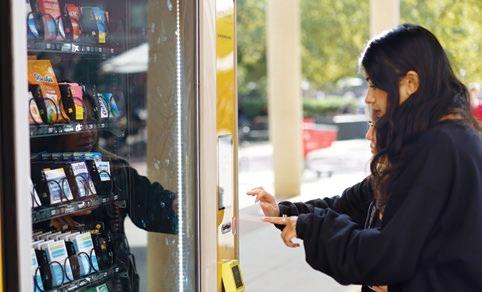
USC students needing immediate over-the-counter medications and emergency contraception can now get access 24 hours a day—without leaving campus. The Mann School’s USC Pharmacies, in partnership with USC Student Health, have installed pharmacy vending machines stocked with birth control, cold and allergy medicines, hygiene products and more.
“People need health products around the clock, and we’re happy to bring the vending machine option to the USC community,” says Raffi Svadjian, executive director of community pharmacies.
Crucially, the machines also offer the easily administered opioid-overdose medication Narcan. “Having access to Narcan is like keeping a fire extinguisher in your home,” notes Shannon De Leon, president of the USC chapter of the American Association of Psychiatric Pharmacists. “You hope you will never need to use it, but in case of emergency, it could save lives.” (See page 28 for more on USC Mann’s Narcan distribution efforts.)
Meanwhile, a generic version of the morning-after contraceptive pill Plan B is available in the machines for just $5—a fraction of the retail price. USC Undergraduate Student Government (USG) joined with the Mann School to underwrite the costs of stocking the pill.
“Having affordable emergency contraception can make a huge difference to students who need it quickly and as privately as possible,” says USG President Divya Jakatdar.
The vending machines are located at USC Village and in the Royal Street Parking Structure on the University Park Campus and outside Seaver Hall on the Health Sciences Campus. The initiative is part of USC and the Mann School’s commitment to student well-being.
“We’re always looking for new ways to improve and expand access to healthcare,” Svadjian says.
MACKAY ELECTED TO NATIONAL ACADEMY OF INVENTORS
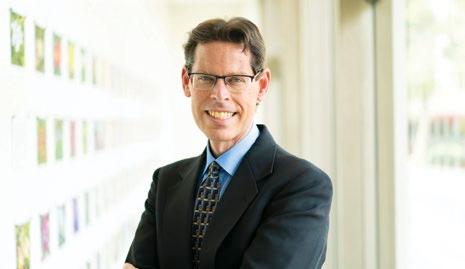
The National Academy of Inventors has named J. Andrew MacKay as a senior member. MacKay, the Gavin Herbert Associate Professor of Pharmaceutical Sciences, engineers protein-polymer tools that could potentially transform the development of precision, multifunctional drug carriers. “Our strategy is to repackage drugs and functional peptides into protein polymers that control release and reduce toxicity,” says MacKay, who holds six patents for his innovations.
RAO RECEIVES NATIONAL EARLY INVESTIGATOR AWARD
Gauri Rao, director of the Center for Quantitative Drug and Disease Modeling at USC Mann, received the 2024 Leon I. Goldberg Early Investigator Award from the American Society for Clinical Pharmacology & Therapeutics (ASCPT).
The award was established in 1986 to honor early-career scientists for accomplishments in the field of clinical pharmacology.
Rao presented the Leon Goldberg Early Investigator Award lecture on March 28 during the ASCPT 2024 annual meeting in Colorado Springs. Her talk focused on connecting pharmacoepidemiology and pharmacogenomics for the benefit of patients.
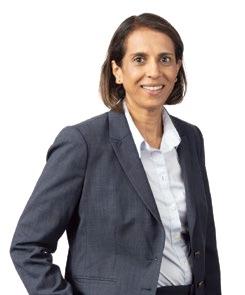
8 USC MANN SCHOOL BROAD SPECTRUM
NIH Renews $3M Grant for MacKay and Hamm-Alvarez

J. Andrew MacKay and Sarah HammAlvarez have earned a National Institutes of Health grant renewal of $2,968,575 to support research into protein-polymer nanomedicine for Sjogren’s syndrome. The five-year project exemplifies interdisciplinary research. MacKay, the Gavin S. Herbert Associate Professor of Pharmaceutical Sciences at USC Mann, holds secondary appointments in biomedical engineering at the USC Viterbi School of Engineering and in ophthalmology at Keck School of Medicine of USC, and is also a faculty member at the USC Norris Comprehensive Cancer Center. HammAlvarez is associate dean for basic and translational sciences at the Keck School and vice chair for basic research at the USC Roski Eye Institute.
Sjogren’s syndrome is a chronic autoimmune disease that attacks the tearcreating and salivary glands, resulting in dryness of the eyes and mouth that compromises ocular and oral health. It affects up to 4 million Americans—more than 90% of them women.
Sjogren’s often accompanies other immune-system disorders such as
CRMC NAMED INAUGURAL RECIPIENT OF HYPERTENSION HERO AWARD
The California Right Meds Collaborative (CRMC), a pharmacist-led initiative founded at USC in partnership with health plans, pharmacies, and academic and professional organizations in Southern California, was honored with the National Hypertension Control Roundtable Hypertension Hero Award.
The award honors individuals or organizations that have created innovative, collaborative programs or partnerships addressing inequities in hypertension control.
Founded by Steven Chen, associate dean for clinical affairs and the William A. and Josephine A. Heeres Chair in Community Pharmacy, CRMC partners with health plans such as L.A. Care and Inland Empire Health Plan to provide
comprehensive medication management through a network of pharmacies. By advancing the role of pharmacists in the healthcare system, CRMC aims to reduce the burden of chronic diseases.
“CRMC offers a scalable solution to dramatically improving blood pressure control across the U.S. by supporting pharmacists through a value-based payment to practice at the top of their license,” Chen says. “This award could not be possible without the great work of our team and partners, particularly L.A. Care Health Plan and the network of participating pharmacies in Los Angeles County.”
Read more about the honor at hypertensioncontrol.org.
rheumatoid arthritis and lupus. Some patients also exhibit weight loss and fatigue—along with dangerous conditions such as internal organ failure and B-cell lymphoma.
Yet, despite its prevalence and severity, no therapies have been approved for treating Sjogren’s. The current standard of care is instead based on managing the dryness it causes. MacKay and Hamm-Alvarez are combining one such approved treatment for dry eye, cyclosporine A, with the potent immunosuppressant rapamycin.
Previous attempts to blend the therapeutic effectiveness of cyclosporine A and rapamycin have been hampered by their low solubility and dose-limiting toxicities. To overcome these obstacles, MacKay and Hamm-Alvarez are developing protein-polymer nanoparticles to deliver the combined medication in ways that maximize its absorption by the inflamed tissues at the root of Sjogren’s while minimizing side effects.
“Knowledge from these preclinical studies will rapidly advance new therapies to clinical trials for this autoimmune disease,” the researchers note.

9 RESULTS SPRING 2024
DEMENTIA DIAGNOSES RISE WITH RISK ADJUSTMENT

Alzheimer’s disease and related dementias (ADRD) are being diagnosed more often, according to research co-written by Geoffrey Joyce, chair of the Department of Pharmaceutical and Health Economics. The study, conducted through the Schaeffer Center for Health Policy & Economics, found that the rise came when Medicare Advantage (MA) added risk adjustment to the payment equation.
A statistical method for calculating individual health needs, risk adjustment leads to higher payments for treating more seriously ill patients than those in better health. It therefore incentivizes doctors to improve dementia detection. This is crucial, since a major challenge in treating ADRD is reaching a diagnosis.
Joyce, who serves as director of health policy for the Schaeffer Center, worked with colleagues to compare ADRD diagnosis rates among MA beneficiaries with those covered under traditional Medicare. Their findings, published in JAMA Network Open, showed that new diagnoses increased by 32,000 persons between 2017 and 2018—and by more than 74,000 between 2018 and 2019. The 2019 uptick in detected cases also broke a trend of flattening diagnoses found from 2016 to 2018.
The researchers believe that the 2019 increase in dementia diagnoses among MA enrollees resulted from the use of risk adjustment. The study builds on previous work by Joyce and Schaeffer Center colleagues showing that 20% of American dementia cases were going undiagnosed.
However, Joyce cautions, “more research is needed to determine whether risk adjustment is truly enhancing dementia detection or is just leading to overdiagnoses and fraud.”
The Schaeffer Center is a partnership of the Mann School and the USC Price School of Public Policy. The National Institute on Aging funded the research.
10 USC MANN SCHOOL BROAD SPECTRUM
NEW SCHAEFFER INSTITUTE LAUNCHED IN NATION’S CAPITAL
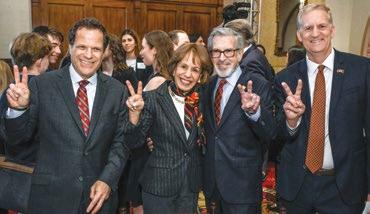
Leonard D. Schaeffer and his wife, Pamela, have donated $59 million to establish the USC Leonard D. Schaeffer Institute for Public Policy & Government Service, which has the dual mission of producing research that informs policymaking to address our nation’s most pressing issues while also fostering new generations of engaged citizens and scholars.
The gift is the single largest ever made by the Schaeffers to USC. By expanding the USC Schaeffer Center for Health Policy & Economics—a partnership of the USC Mann School and the USC Price School of Public Policy—and the Leonard D. Schaeffer Fellows in Government Service, the new institute will be poised to significantly increase both programs’ scope, size, and national and international impact.
“The newly formed Schaeffer Institute accelerates USC’s capacity to develop effective academic leaders and to forge critical, high-impact partnerships with influential policymakers and organizations,” USC President Carol Folt said in announcing the institute’s creation.
The new institute will be the first major research and education facility headquartered at the new USC Capital Campus in Washington, D.C., and will also maintain offices on the USC University Park Campus in Los Angeles.
Schaeffer—a longtime member of the USC Board of Trustees—said the new institute has the potential to have a long-lasting impact at a time when the United States needs it most.
“Our country is experiencing a series of challenges that are unique in our history,” he said. “The institute will have the faculty, students and postdocs to provide the analysis and facts
necessary to counter erosion in public discourse and promote more effective policy solutions.”
The institute will establish a permanent presence for the university in the capital and serve as a launching pad for interdisciplinary researchers and policy experts to address national and global challenges in close collaboration with leading government and academic institutions. USC will accomplish this by bringing together the knowledge and expertise of all 23 USC schools in a coordinated and strategic way.
The new institute will enhance the reach of the Schaeffer Center, which ranks among the nation’s premier centers focused on health policy. For more than a decade, policymakers and stakeholders in Congress, the Centers for Medicare & Medicaid Services, the Government Accountability Office, the White House, the National Institutes of Health and other government entities have relied on Schaeffer Center research to inform their decision-making.
“The Schaeffer Institute will be an invaluable resource for education and scholarship, not just for Schaeffer scholars and affiliated experts but for faculty members and students from multiple
disciplines across USC,” said Dana Goldman, dean of USC Price, co-director of the USC Schaeffer Center, and Distinguished Professor of Public Policy, Pharmacy and Economics at both USC Mann and USC Price.
Like the center, the Schaeffer Institute will operate in collaboration with USC Price and the USC Mann.
“The Schaeffer Center is a pioneer in interdisciplinary collaboration to foster effective health policies, including addressing such crucial issues as pharmaceutical innovation and access to mental health therapies,” said Vassilios Papadopoulos, dean of USC Mann and the John Stauffer Dean’s Chair in Pharmaceutical Sciences. “This new institute will widen the scope of such vital, value-focused scholarship and further build on Leonard Schaeffer’s legacy of health-policy leadership.”
Goldman will become director of the Schaeffer Institute and will remain co-director of the Schaeffer Center with Erin Trish, associate professor in the Department of Pharmaceutical and Health Economics at USC Mann. Goldman will step down as USC Price dean on July 1, when the institute is scheduled to open.
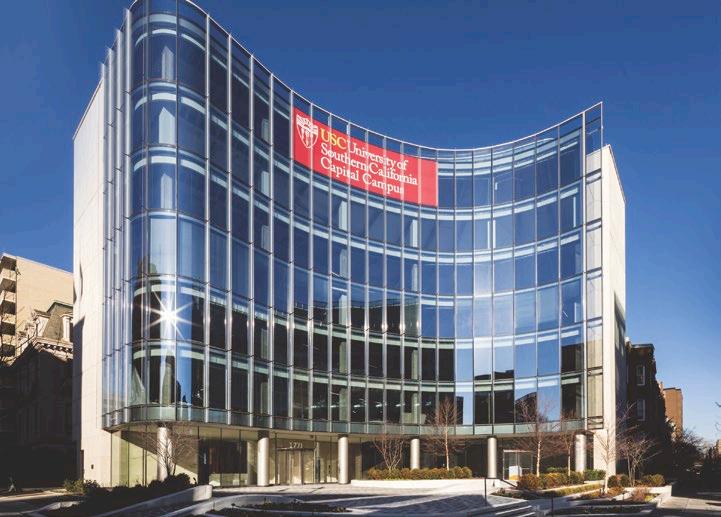
11 RESULTS SPRING 2024
Pictured at the celebration: Dana Goldman, USC
President Carol Folt, Leonard Schaeffer and USC
Provost Andrew T. Guzman
USC’s new Capital Campus in Washington, D.C.


A B U N D A N T
I N N O VAT I O N
A ROUNDTABLE EXPLORING HOW ARTIFICIAL INTELLIGENCE IS CHANGING THE FIELD OF PHARMACY AND PHARMACEUTICAL SCIENCES
Artificial intelligence (AI) is here to stay and evolving rapidly. It promises to revolutionize pharmacy education and clinical care as well as drug development, discovery and delivery—but fulfilling that potential requires careful and ethical stewardship. Results asked faculty experts to weigh in on how AI-related technologies can be harnessed to expand the profession’s frontiers—without losing the human element.
12 USC MANN SCHOOL

How is AI changing your field?

STEVEN CHEN, associate dean for clinical affairs and the William A. and Josephine A. Heeres Chair in Community Pharmacy : One of the greatest opportunities for AI is to improve health quality and equity by making care more efficient, accessible and consistent with safeguards to prevent harm. Healthcare providers, including pharmacists, simply don’t have enough time or capacity to manage all of the documentation and processes involved in delivering high-quality care services. The potential for AI to help

prioritize patient needs, predict challenges, automate documentation and improve workflow is much needed.
GAURI RAO, director of the Quantitative Drug and Disease Modeling Center : The big advantage of AI is in drug development and drug discovery. Every drug discovery program has a minimum of 10,000 failures that can help inform success. A machine can easily integrate that knowledge, while a human cannot. This makes it easier to query data for that next target and molecule. It reduces time, money and failure rates. AI can also facilitate such mundane but crucial tasks as sample scheduling.


13 RESULTS SPRING 2024



IAN HAWORTH, vice chair of Pharmacology and Pharmaceutical Sciences: While AI is revolutionizing computational chemistry, it still depends a lot on the human touch. The interpretation of algorithms remains in the hands of the researcher.


SERGHEI MANGUL , assistant professor, Clinical Pharmacy and Quantitative and Computational Biology : The healthcare landscape has traditionally been providercentric, with a predominant reliance on physician expertise and the healthcare delivery value chain. Recent advancements in AI—particularly in the development of large language models—along with the digitalization of health records promise to improve clinical practice and reevaluate the patient’s role in healthcare delivery services.

VASSILIOS PAPADOPOULOS, dean, John Stauffer Dean’s Chair in Pharmaceutical Sciences: It’s benefiting pharmacies by optimizing the processes of inventory management, restocking, and even the financial and marketing side. We haven’t yet seen an AI-designed drug, but the technology will certainly play a role in optimizing the process of pharmaceutical engineering, just as it is already doing in automation. What now takes 10 to 15 steps will become five, reducing costs dramatically.

HOVHANNES GUKASYAN, director of the MS in Drug Development program: In education, using AI for routine tasks, study guides, rubrics, etc., could allow more time for teachers to have human interaction with students.
14 USC MANN SCHOOL
Students are exposed more and more to data science and bioinformatics now through the school. It’s an important component of the training we provide.
DEAN VASSILIOS PAPADOPOULOS

How are you using AI?
MANGUL: My group is committed to advancing AI algorithms tailored for the analysis of personal health records datasets. Our mission is to empower patients by providing the tools they need to take control of their health, offering valuable insights to guide diagnostic and treatment decisions, and ultimately enhancing clinical outcomes. We aim to revolutionize healthcare by harnessing the power of AI for the betterment of patient care and well-being.

MARYANN WU, assistant dean for assessment: Ian Haworth and I have worked on some incredibly rewarding projects, including building the online syllabus platform AARDVARC [Automated Approach to Reviewing and Developing Valuable Assessment Resources for your Curriculum]. AARDVARC streamlines programmatic, curricular, faculty, teaching and experiential data and is recognized by the American Association of Colleges of Pharmacy.
With [Director of Professional Experience Programs] Ying Wang, we have also used the AI platform KNIME to evaluate PhD student data and optimize the order of Advanced Pharmacy Practice Experiences for greater success. We have been invited to publish our research in the American Journal of Pharmaceutical Education in a special edition on student success.

WILLIAM PADULA , assistant professor of pharmaceutical and health economics and a fellow at the USC Schaeffer Center : Pressure injuries are the fastest rising hospital-acquired condition, kill more patients each year than car accidents and cost U.S. health systems more than $25 billion annually. The standard-of-care guidelines
for preventing pressure injuries are taxing on nurses, extremely outdated, and don’t account for age, race or skin color, which are important risk factors.
Funded by the National Institutes of Health, I’ve been working for several years with collaborators at the Keck School of Medicine of USC, Johns Hopkins University, University of Chicago and other institutions on what we believe is the first study to use AI to help better detect and prevent pressure injuries. We used machine-learning methods to develop a logistic algorithm to more effectively predict patient risk and direct care to those who need it, saving resources, time—and lives.
How is USC Mann preparing students for success in the AI age?
CHEN: Our curriculum is undergoing a revision that includes AI training, both in terms of current and future applications. We are exploring partnerships with organizations with aligned interest in developing or testing AI applications, which our students would also be involved in.
Today’s student has the advantage of growing up in an era when computer sciences are part of their core curriculum (back in my day, typing was in my core curriculum!).
As a result, students are in a position to be part of the solution for development, implementation and refinement of AI applications in pharmacy practice as well as in the healthcare industry as a whole.
PAPADOPOULOS: Students are exposed more and more to data science and bioinformatics now through the school. It’s an important component of the training we provide.
15 RESULTS SPRING 2024
AI AT USC
USC’s pioneering AI efforts are enhanced by interdisciplinary collaborations that span not just the university but also the globe. The cornerstone of USC’s AI initiatives is the $1 billion-plus Frontiers of Computing—a multipronged enterprise to expand the power of AI and related technologies while infusing necessary ethical considerations. These rapidly growing efforts build on USC’s longtime preeminence in technology. They include the:
›› USC School of Advanced Computing, enhancing ethical education, advancing pioneering research and expanding USC’s presence in the Silicon Beach part of L.A. County’s growing tech corridor
›› Center for New Technologies in Drug Discovery and Development— a partnership including USC Mann, the Keck School of Medicine of USC, and the Rosalie and Harold Rae Brown Center for Cancer Drug Development—that applies AI to pharmaceutical innovation
›› Center on Artificial Intelligence Research for Health, uniting AI experts with healthcare researchers to catalyze breakthroughs in areas including precision medicine, clinical data management and telehealth
›› USC Michelson Center for Convergent Bioscience, tackling the most critical health issues through genomic and computing technology
›› USC Center for Body Computing, one of the nation’s first academically based digital health research and innovation endeavors
›› USC Center for AI in Society, demonstrating how AI can be used to address challenging societal problems
›› USC Center for Generative AI and Society, exploring the transformative impact of AI on culture, education, media and society
›› USC Center for Autonomy and Artificial Intelligence, fusing disciplines to advance AI developments for autonomous systems, including robotics and mobility systems
›› Generative Artificial Intelligence Research Program, funding the creation of new information from patterns of existing data
At USC, we are blending advanced AI techniques with the university’s diverse expertise to further social good, tackling urgent issues from health inequities to HIV and homelessness among young adults.
ERIC RICE, Founding Co-director of the USC Center for AI in Society and a professor at the USC Dworak-Peck School of Social Work


16 USC MANN SCHOOL



RAO: The Quantitative Drug and Disease Modeling Center will intersect engineering and math with pharmacy. What the field needs is people who can train these algorithms and know when AI gives you wrong information—and that’s the challenge our center will work to fulfill. This is one reason why the school’s proposed partnership with the Viterbi School of Engineering is so important. We’ll be preparing experts in both fields. Part of this is developing a master’s degree in pharmacometrics, which the Mann School is actively engaged in.
MANGUL: We have introduced two AIrelated courses aimed at equipping students with a solid foundation in data science, bioinformatics, biostatistics, algorithms and their practical applications, with a particular emphasis on biomedical research. Our curriculum will emphasize the cultivation of problem-solving and critical-thinking skills, moving beyond mere memorization of information. This mindset is crucial for students to adapt to the ever-evolving landscape of AI technologies and applications.
Furthermore, we are committed to promoting ethical and responsible AI practices. We are infusing our curriculum with ethical principles and responsible AI considerations, ensuring that students gain a comprehensive understanding of AI’s societal implications. This includes exploring topics such as bias, fairness, transparency and accountability within AI systems.
WU: It’s imperative to prepare our students on how to judiciously use AI as it inevitably becomes ingrained in their future work lives. Many of the traits of being a good scientist (such as being logical, objective, skeptical— and at the same time curious and openminded) are vital in applying AI effectively.
17 RESULTS SPRING 2024

How can we avoid the pitfalls of AI?


KARI FRANSON, senior associate dean for academic and student affairs: People tend to jump to concerns about AI replacing humans. But what we see AI actually—and successfully—doing is more incremental. Instead of diagnosing and treating patients (where IBM Watson failed in oncology patients), or treating diseases with many of our digital therapeutic technologies (where its effectiveness and engagement wane over time), it is in ensuring that healthcare workers wash their hands when they enter a patient’s room or reorder necessary medications.
CHEN: The greatest danger of integrating AI into pharmacy practice probably stems

from adoption of tools and technologies that either don’t deliver as promised or are allowed to operate without adequate human oversight or input. Healthcare and medication use isn’t an automated decision or algorithm. Patient preferences, cultural norms and values, and gaps in their understanding of conditions or medications, etc., need to be accounted for.
WU: Researchers have already shown the potential risks of AI, including data security and privacy issues. Biases can also easily occur from unbalanced data being put into an algorithm. This is where humans are critical to ensure that we review how information is being collected, what information is being used and continuously review algorithms during development and implementation.
GUKASYAN: In drug research and development, AI is already being used for internal decision-making. However, caution must be exercised with interacting with regulators. Suitability and validation with real-world evidence have to replace AI and machine learning in the final steps of R&D.
HAWORTH: AI in the context that I use it still depends a lot on human intelligence. So we’re not generating machines that think for themselves. We are looking at relationships within data. These are really hard to see, because there’s a lot of data and the relationships are complex. We use the machine to establish that relationship—but, in the end, we are still using our own knowledge to interpret the results. So I don’t think there’s any concern there.
18 USC MANN SCHOOL
AI, machine learning and related technologies will expand in the pharmacy space with the primary goals of improving efficiency, accuracy and safety in the provision of medications. This will allow pharmacists and pharmacy staff to spend more time ensuring patients receive optimal results from medication therapy.
STEVEN CHEN

RAO: People too often skim the surface and don’t think they need deeper knowledge because any topic can be Googled. So even as we prepare future experts, we need to keep teaching about our history, because that lets students know how far we’ve come and what has been implemented or not—and why. Otherwise, students just become consumers of knowledge instead of generators of the new information needed for future breakthroughs.
What does the future hold for AI and pharmacy?
PAPADOPOULOS: AI is here to stay and improving. There will be many positive things, but we have to be fully aware of the limitations and risks. The human factor remains essential to interpreting data and making decisions. I also think we’ll see a difference in clinical trial design and execution. You now have to depend on hundreds of patients for phase 2 trials—and hundreds of thousands for phase 3. However, with all the data coming in from successful and failed trials, you can determine doses more precisely and effectively so that we can reach results with far fewer patients.
CHEN: AI, machine learning and related technologies will expand in the pharmacy space with the primary goals of improving efficiency, accuracy and safety in the provision of medications. This will allow pharmacists and pharmacy staff to spend more time ensuring patients receive optimal results from medication therapy. Allowing pharmacists and pharmacy staff to practice at the top of their training and licensure is key to overcoming the challenges in our healthcare system with health outcomes, quality and safety measures, and health disparities.
AI can also help community pharmacies fulfill their potential of being the health and
social services hub in every neighborhood. It has the potential to reduce the time and resources pharmacists devote to medication preparation and dispensing, while increasing time and efficiency for direct patient care services.
FRANSON: I hope that all pharmacists will embrace AI to improve outcomes wherever possible.
MANGUL: This is the beginning of our journey. Our collective understanding of different types of intelligence, both human and machine, is likely to shift and evolve as we continue accelerating the technology and gaining more insights into the capabilities of both.
As AI and machine-learning technologies advance, we will likely discover new dimensions of machine intelligence. This may include improved natural language understanding, pattern recognition and the ability to perform complex tasks that were once considered exclusive to humans. The evolution of intelligence concepts will have implications for education and training. We may need to prepare individuals for roles that involve collaborating with intelligent machines, which could require new skill sets and interdisciplinary knowledge.
WU: Artificial intelligence has already profoundly changed our lives and will likely transform almost every industry in the next few years—from healthcare to science to education. As they say in the African proverb, “If you want to go fast, go alone. If you want to go far, go together.” This “togetherness” includes our current and future synergies between humans and artificial intelligence. The future is bright if we continue to harness the power of AI in ethical and responsible ways.
19 RESULTS SPRING 2024
QSAD Centurion: Decades of Leadership and Support
QSAD, formerly written on almost every prescription, stands for quantum sufficit ad, meaning “as much as is sufficient.” Founded in 1958, QSAD Centurion remains USC Mann’s premier support group. Here, QSAD President Ken Thai, PharmD ’02, offers an update on the group’s focus and recent endeavors.
What role does QSAD Centurion play at USC Mann?
QSAD has always been the school’s premier alumni organization. When I was a student, there was a mystique about the QSAD board. We felt it was something we aspired to be a part of upon graduation. They were raising hundreds of thousands of dollars for endowments, student scholarships and everything else.
Tell us about the 2023 QSAD golf tournament. We had an amazing response. We sold out within two weeks of announcing the event. That gave us a lot of confidence and momentum.
What would you like people to know about QSAD?
Our board is excellent and they’re willing to pay forward some of the things that USC has done for them. It all starts with the right people.
Another key to being successful is to be purposeful and make sure there’s meaning in your work. You also want to have fun and enjoy the process. That’s what we’re trying to combine in QSAD. The Trojan network is so strong and vast. We have great folks within the USC Mann family, and I think even more people want to get involved. The sky’s the limit.
The 2024 QSAD Golf Tournament took place Monday, April 15. To learn more about QSAD and get involved, visit mann.usc.edu/alumni.

(Front) Duane Saikami, Daniel Rim, President Ken Thai and Angela Chandna (Back) Ricky Ma, Lilia Xu, Jesse Hong, Jay Yamamoto, Charles Le Bon, David Truong, John Bruce, David Makhani and Samuel Lee

20 USC MANN SCHOOL GIVING
QSAD Centurion: A Timeline

1958
QSAD Centurion is established by alumni and friends as the school’s leading support group.
1962
QSAD members underwrite the building and furnishing of a modern suite of offices for the dean and administrative staff.
1978
Members pledge $400,000 to create the endowed QSAD Centurion Professorship of Pharmaceutical Sciences.
2001
With support from QSAD Centurion, USC Mann holds its first White Coat Ceremony for incoming first-year students at Mayer Auditorium.
2004
QSAD Centurion launches a $350,000 fundraising effort to transform a conference room in the John Stauffer Pharmaceutical Sciences Center (PSC).
2005
USC Mann’s 100-year anniversary celebrations conclude with the official opening of Centennial Park and the QSAD Centurion Executive Conference Room (PSC 104).
2010
The QSAD Centurion Executive Plaza in Centennial Park is dedicated, with Oscar Pallares, PharmD ’55, honored for five decades of continuous support.
2016
QSAD Centurion receives the USC Alumni Association’s Volunteer Organization of the Year Award.
2023
QSAD relaunches annual golf tournament at Mission Viejo Country Club, raising funds for scholarships.
21 RESULTS SPRING 2024
Best of the Best
Jan Marie Salcido has been named a top 10 pharmacist nationally for her devotion to keeping customers healthy while saving them money.
The prescription savings service SingleCare has honored Jan Marie Salcido, PharmD ’14, with a 2023 Best of the Best Pharmacy Award. The prize recognizes pharmacists, pharmacy technicians and pharmacy staffs nationwide for going “above and beyond” in providing customer service and promoting community health.
The award has special meaning because nominations come from customers, notes Salcido, pharmacy manager at Ralphs #96 in Pasadena, Calif. Out of thousands of nominations sent in nationwide, Salcido was one of 10 pharmacists selected by SingleCare’s editorial board for the honor.
After earning her bachelor’s degree in chemistry, Salcido originally pursued a career in biotech but wanted to have a more direct impact on improving people’s lives. She found the answer when her husband pointed to an article ranking “pharmacist” as the top career choice for women. Inspired by the opportunity to blend her scientific acumen with a people-centered career, Salcido applied to USC Mann. “Immediately, I knew this is what I was meant to do,” she says.
Today, Salcido oversees a dedicated team while ensuring that each patient receives personalized care. Since pharmacy is about far more than dispensing prescriptions, she does everything possible to fulfill patients’ unique needs. This ranges from helping vacationers traveling without their medications to liaising between specialists
and insurers on effective treatments that avoid adverse side effects. It also means helping patients become advocates for their own health. “We’re always trying to sneak in ways that lifestyle changes can help patients with their conditions—like encouraging walking for exercise,” Salcido says.
In addition, Salcido strives to protect patients’ pocketbooks. “It’s so tricky the way insurance works now, especially Medicare,” she notes. “If patients aren’t told by their pharmacy team, they don’t even know that there are options to save money.”
Her employers consider Salcido such an exemplar of the profession that Ralphs’ parent company, Kroger, called on her to consult on a commercial. She advised the actress playing a pharmacist on details including proper immunization techniques.
But accolades and directors calling “action” are not what drive her. Ultimately, she says, what fulfills her is “helping—in the pharmacy and outside of the pharmacy.”
That’s why, in addition to her work at Ralphs, she says, “I volunteer at a food bank called Friends In Deed and its program called The Women’s Room, which is a safe place for homeless women.” Every Wednesday morning, Salcido visits the women there to help distribute toiletry kits and snack bags.
Salcido’s commitment to her customers is summed up by the name badge she wears to work, which states, succinctly: “I love my job.” Judging by the nominations that flowed in for the SingleCare award, many people in the Pasadena community love having her as their pharmacist.
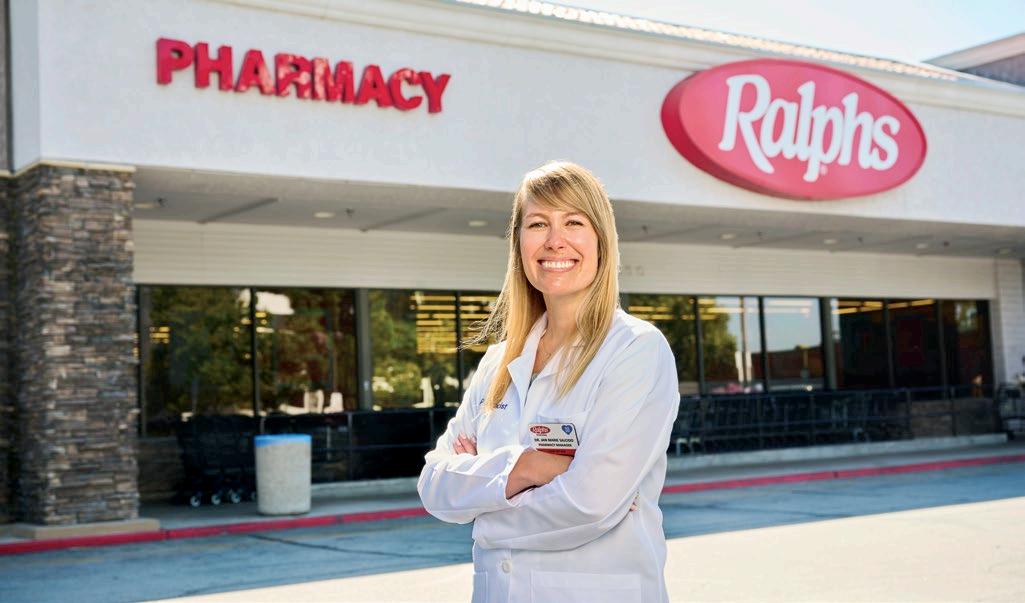
22 USC MANN SCHOOL ALUMNI
RECOGNIZING OUTSTANDING LEADERS: 2024 USC Mann Alumni Awards Gala
Held on February 24 at the Westdrift Manhattan Beach, the 2024 Alumni Awards feted eight USC Mann honorees who exemplify leadership in pharmacy and the pharmaceutical sciences.
The night began with a special performance by The Spirit of Troy, USC’s Trojan Marching Band, followed by welcome remarks by Dean Vassilios Papadopoulos. After the presentation of eight awards, the event concluded with a live performance from the SoCal VoCals, USC’s oldest a capella group.
The following awards were presented:
» Mary Ellen Cosenza, PhD, MS ’08, the Regulatory Science Award
» Steven Dohi, PharmD ’84, the Distinguished Alumni Award
» Eric Forssen, PharmD ’77, PhD ’81, the Research Achievement Award
» Annie Ogostalick, PharmD ’97, MS ’00, the Pharmaceutical Health Economics Award
» Michael Pazirandeh, PharmD ’11, the Young Alumni Award
» Robert Popovian, PharmD ’93, MS ’96, the Dean’s Medallion Award
» Raffi Svadjian, PharmD ’03, MBA, the Community Service Award
» Ramesh Upadhyayula, BPharm, RPh, APh, the Honorary Alumni Award
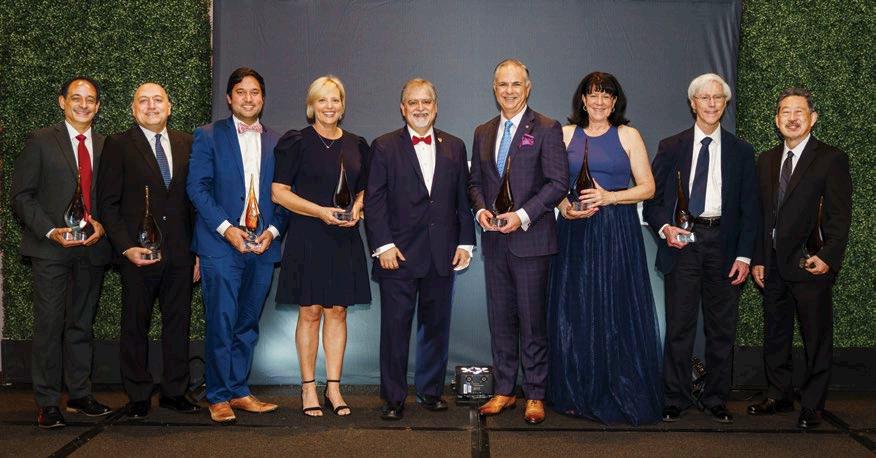
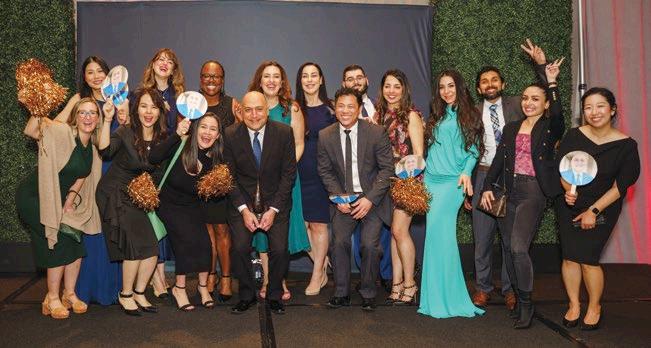
1. Ramesh Upadhyayula, Raffi Svadjian, Michael Pazirandeh, Annie Ogostalick, Dean Vassilios Papadopoulos, Robert Popovian, Mary Ellen Cosenza, Eric Forssen and Steven Dohi
2. Honoree Raffi Svadjian and members of the community pharmacies team
3. Vinson Lee and Anna Deng
4. Pooja Singh, PharmD student president, displaying a signed football helmet that was auctioned off at the gala
5. Josephine Heeres
6. SoCal VoCals a capella group 1 2 4 5 6 3




23 RESULTS SPRING 2024

class notes
We want to hear from you! Submit your updates and career news to mann.usc.edu/class-notes to be included in the next edition of Class Notes.
1970 s
Craig Stern , PharmD ’76 , is president of Pro Pharma Pharmaceutical Consultants Inc.
1980 s
Julie Allen , PharmD ’83 , is a general manager at CarePoint Partners, a BioScrip Company.
Nadrine Balady-Bouzian , PharmD ’83 , is director of pharmacy services at the Los Angeles County Department of Health Services.
Richard D’Assalenaux , PharmD ’83 , is adjunct assistant professor and assistant dean of assessment and accreditation at West Coast University.
Thomas Diamantidis , PharmD ’83 , is co-founder, co-CEO and copresident at Asteria Health.
Christine Low, PharmD ’83 , is director, medication safety and compliance, at Scripps Health.
Kathy Nakaki , PharmD ’83 , is a pharmacist at Kaiser Permanente.
Robert Reichelderfer, PharmD ’83 , is a clinical pharmacist at Centinela Hospital.
Leo Sokolskiy, PharmD ’83 , is director of pharmacy services at Scripps Health.
Solange Stramler-Bohi, PharmD ’83 , is a pharmacy manager at Vons.
Joe Tami , PharmD ’83 , works in drug development at Lpath Therapeutics.
Angie Wong, PharmD ’83 , is a clinical pharmacist at Sharp HealthCare.
Jill Bennett , PharmD ’87, is a senior medical science liaison at F2G.
Steve Leuck , PharmD ’87, self-published an autobiography, A Pharmacist’s Story, available on Amazon.
Melani Baker, PharmD ’88 , is a staff pharmacist at RiteAid.
1990 s
Gavin Choy, PharmD ’92 , is chief operating officer at Beyond Cancer.
Lynn Matsukawa , PharmD ’92 , is an antimicrobial stewardship pharmacist at Queen’s Medical Center.
Terry Lim , PharmD ’98, is a controlled substance diversion specialist at Stanford Children’s Health.
Wilson Meng, PhD ’98 , is a professor of pharmaceutics and division head of the Pharmaceutical, Administrative and Social Sciences Division at Duquesne University.
Bela Patel , PharmD ’98 , is a board-certified health and wellness coach and pharmacist at WholisticPharmacist.
2000 s
Dikran Parsekyan , PharmD ’00, is clinical manager of the Pharmacy Prescription Refills Department at Facey Medical Foundation.
Hooman Milani , PharmD ’02 , is a pharmacy clinical services manager at Keck Hospital of USC.
ALUMNI
24 USC MANN SCHOOL
Vaishali Patel , PharmD ’02 , MS Pharmaceutical Economics ’04 , is senior director of patient-centered outcomes research at AbbVie.
Nicole M. Tran , PharmD ’02 , is senior medical science liaison at Recordati Rare Diseases Inc.
Sarica Klein , PharmD ’06, is national field director of neuropsychiatry at Biogen.
Valerie San Luis , PharmD ’06 , is an associate medical science liaison at AstraZeneca.
Gaurav Sharma , PharmD ’06 , is senior director and head of global medical science liaisons at Agios Pharmaceuticals.
Sheena Jindal , PharmD ’09 , MS Regulatory Science ’09, is an inpatient pharmacy manager at PIH Health.
2010 s
Reatanak “Ray” Kong , PharmD ’06 , is an associate director, managed care liaison, at Neurocrine Biosciences.
Crystal Chang , PharmD ’09 , is a medical science and managed care liaison at Adlon Therapeutics.
Tina Patel , PharmD ’12 , is director of quality and member experience, Medicare and retirement, at UnitedHealthcare.
Anet Melkomian , PharmD ’16 , is manager of clinical research pharmacy services at Amgen.
Brian Phan , PharmD ’17, is a critical care clinical pharmacy specialist at Riverside University Health Center.
2020 s
Philippos Papadopoulos , MS Regulatory Science ’20, is a regulatory affairs specialist at Network Partners.
Yuvansh Khokhani , BS Pharmacology and Drug Development ’21 , started a research and development company, YSK Laboratories, in Mumbai, India.
Gregory Vera Cruz , PharmD ’21 , is a clinical pharmacist at Harbor-UCLA Medical Center.
Diana Garnica , PharmD ’22 , is a clinical pharmacist at Lucile Packard Children’s Hospital Stanford.
Amy Li , MS Biopharmaceutical Marketing ’23 , is a career discovery program associate at Amgen.
Catherine Tran , PharmD ’22 , is a PGY2 emergency medicine pharmacist at Memorial Medical Center.
Michael Yartzoff, DRSc ’22 , is director of quality assurance and regulatory affairs at Charles River Laboratories.
Eleonso Cristobal , PharmD ’23 , MS Healthcare Decision Analysis ’23 , is a clinical pharmacist at MedWatchers.
Caterina Kachadoorian, PharmD ’23 is a global regulatory affairs fellow at Agios Pharmaceuticals.
Amina Khan , MS Molecular Pharmacology and Toxicology ’23 , is a staff research associate at the University of California, San Francisco.
Richard Lo, PharmD ’23 , is a postdoctoral fellow in medical affairs at MannKind Corporation.
Shambhavi Nabar, MS Regulatory Science ’23 , is a regulatory affairs specialist at Boston Scientific.
Anish Panwalkar, MS Healthcare Decision Analysis ’23, is a decision analytics associate at ZS.
Sean Pappa , PharmD ’23 , is a postdoctoral fellow with the U.S. Retina Gene Therapies Marketing Team at Janssen Pharmaceutical Companies of Johnson & Johnson.
Shani Park , PharmD ’23 , is a U.S. market access fellow at Inizio.
Khooshbu Patel , MS Clinical and Experimental Therapeutics ’23 , is a bioinformatician at Duke University School of Medicine.
John “Jack” Saville , BS Pharmacology and Drug Development ’23 , is surface warfare officer in the United States Navy.

IN MEMORIAM
George Sheu , PharmD ’55 , died January 26, 2024.
Brian Ellinoy, PharmD ’68 , died November 5, 2023.
Sam Toru Kita , PharmD ’68 , died November 23, 2023.
Katherine G. Moy, PharmD ’85 , died January 20, 2024.
John William Heitritter, PharmD ’89 , died August 29, 2023.
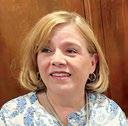
Juana Prieto, longtime staff member at the USC Mann School, died August 16, 2023.
25 RESULTS SPRING 2024
Padula Wins 2023 Frontier Award

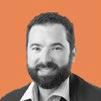
William Padula—USC Mann assistant professor of pharmaceutical and health economics and a fellow at the USC Schaeffer Center for Health Policy & Economics—garnered a 2023 Frontier Award in Value Assessment from the Pharmaceutical Research and Manufacturers of America (PhRMA) Foundation. The award provides $500,000 in funding over three years.
Padula is using the funds to investigate applications of generalized risk-adjusted cost-effectiveness (GRACE) to valuing cancer therapies. The GRACE model was codeveloped by Darius Lakdawalla, the Quintiles Chair in Pharmaceutical Development and Regulatory Innovation at USC Mann and director of research at the Schaeffer Center. Lakdawalla is also collaborating on the study, which is being conducted in partnership with clinical investigators at the interdisciplinary Lawrence J. Ellison Institute for Transformative Medicine of USC.
GRACE is designed to improve healthcare valuation by accounting for patients’ preferences and diminishing returns. “We aim to illustrate the utility of GRACE to improve interpretation of the value of treatments for the most common cancers affecting women and men—breast cancer and prostate cancer,” Padula says.
To ensure that patients’ voices are heard in this process, the research team is engaging with support organizations CancerCare and The Breast Cancer Fundraiser.
CAMARERO EARNS AMERICAN CANCER SOCIETY GRANT

Julio A. Camarero, the John A. Biles Professor in Pharmaceutical Sciences at USC Mann, received a $300,000 Discovery Boost Grant from the American Cancer Society. The funding supports his research therapeu-
tically targeting the Hdm2/HdmX E3 ligase that drives colorectal cancer.
Camarero’s project builds on his development of a bioactive cyclotide known as MCo-52-2 that can suppress Hdm2/HdmX E3 ligase activity in vitro and in vivo. His team is refining the cyclotide’s potential
as a therapeutic agent in mouse models of metastatic colorectal cancer.
“We anticipate that developing selective, potent and affordable specific Hdm2/HdmX E3 ligase inhibitors will mark a new era in developing novel peptide-based therapeutics to treat cancer,” Camarero says.
26 USC MANN SCHOOL FACULTY
QATO AWARDED GRANT TO ADDRESS OPIOID-USE DISORDERS

Dima M Qato, Hygeia Centennial Chair at USC Mann, has received a $437,920 grant from the Foundation for Opioid Response Efforts (FORE) to assess the impact of the availability of buprenorphine for opioid-use disorder at pharmacies across the U.S.
Just 18% of people with opioid-use disorder report using lifesaving medications such as buprenorphine in their recovery—despite efforts to increase the number of providers who can prescribe it. Qato aims to determine which patients and communities are most at risk from gaps in buprenorphine availability. The grant is among $900,000 in funding recently awarded as part of FORE’s commitment to ameliorating the nation’s opioid crisis.
Qato directs USC Mann’s Program on Medicines and Public Health. She is also a senior fellow at the USC Schaeffer Center for Health Policy & Economics and member of the USC Institute for Addiction Science and USC Spatial Sciences Institute.
Her collaborators include Adam Leventhal of the USC Institute for Addiction Science and Keck School of Medicine, Sarah Axeen of the USC Schaeffer Center and Keck School, Robert Vos of the USC Spatial Sciences Institute and USC Dornsife, and Jenny Guadamuz, a former postdoc at USC Mann and the Schaeffer Center who is now at the UC Berkeley School of Public Health.
New Face
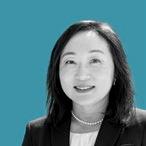
Jeany Kim Jun, PharmD, MPH, has joined the USC Mann School as associate professor of clinical pharmacy in the Titus Family Department of Clinical Pharmacy. She is also director of collaboration and community outreach, overseeing the school’s interprofessional collaboration and co-curricular community health outreach efforts.

WONG-BERINGER RECEIVES MERCK GRANT
Annie Wong-Beringer, USC Mann associate dean for research affairs, received a $364,140 grant from Merck for work aimed at reducing the antibiotic resistance of extended-spectrum betalactamase (ESBL)-producing Enterobacterales. ESBLs are a diverse group of enzymes that destroy the effectiveness of many commonly used antibiotics, while Enterobacterales are a vast order of bacteria that frequently cause infections in healthcare settings and communities.
Wong-Beringer’s project focuses on carbapenems, which are among the few antibiotics still able to treat ESBL Enterobacterales. But the more these antibiotics are used, the more ESBLs evolve to overcome their effectiveness. Wong-Beringer is examining two species of Enterobacterales, E. coli and K. pneumoniae, to determine exactly what drives carbapenem resistance. The findings will better inform treatment selection to reduce resistance and improve patient outcomes, she says.
Previously chair of the Department of Clinical and Administrative Sciences at the Keck Graduate Institute’s School of Pharmacy and Health Sciences, Jun has extensive academic, administrative and clinical experience that includes faculty positions at Loma Linda University and Western University of Health Sciences.
Her most recent clinical practice was based at the Population Health— Diabetes and Specialty Care Centers at Emanate Health Queen of the Valley Hospital in West Covina, Calif., where she served as an ambulatory care pharmacist. She has received numerous teaching awards and was part of a pharmacy practice mission in Cambodia.
Jun is returning to the USC Health Sciences Campus 21 years after completing her residency in primary care pharmacy practice at USC Mann. She received a PharmD from the University of California, San Francisco, and holds a Master of Public Health degree, with a focus on health administration and international health, from Loma Linda University School of Public Health.
27 RESULTS SPRING 2024

USC students can now obtain the opioid-overdose medication naloxone at no cost—and without having to fill out any forms. The distribution is made possible by NaloxoneSC, an initiative of the USC Student Chapter of the American Association of Psychiatric Pharmacists (AAPP-USC).
NaloxoneSC makes the treatment available in the form of Narcan, an easily administered nasal spray. The kits assembled by students also include fentanyl test strips for detecting the dangerous drug in other substances.
“While the distribution of naloxone doesn’t eliminate the occurrence of overdoses, ensuring the availability of this medication can diminish harm and potentially save lives,” says Shannon De Leon, a third-year PharmD student and president of AAPP-USC.
AAPP-USC founded NaloxoneSC in 2021 in response to the nationwide rise in opioid-related deaths, a tragic trend to which the USC student body has not been immune.
“USC is an academically challenging institution and, unfortunately, I have observed instances where students turn to medications to alleviate stress,” De Leon says. “Introducing a straightforward and widely accessible initiative like NaloxoneSC significantly enhances the ability to avert overdoses in the future.”
NaloxoneSC collaborates with USC Student Health to distribute Narcan at no charge. Students can pick up the medication at the Trojan Farmers Market on Wednesdays at McCarthy Quad, as well as on the first floors of the Engemann and Eric Cohen student health centers.
Additionally, Narcan is now available without a prescription as a covered benefit of the USC Student Health Insurance Plan (SHIP/Aetna) with no copay. It can also be purchased at the USC Pharmacies and the pharmaceutical supply vending machines located on both campuses. (See page 8 for more on the new pharmacy vending machines.)
Advancing Student Success and Well-Being
Reaffirming USC Mann’s dedication to support and inclusivity, the school’s diversity and wellness initiatives have been centralized into the new Office of Organizational Success and WellBeing. Melissa Durham—head of the school’s diversity, equity, inclusion and belonging (DEIB) efforts since 2019— leads the office as associate dean of organizational success and well-being.
“The intent is to make clear and reemphasize the ‘why’ behind these initiatives, which are vital because they contribute to the excellence and success of the entire USC Mann community,” Durham says.
Jeremy Dow, PharmD ’21, MEd, who promoted social justice outreach as a USC Mann student and now works as a clinical pharmacist at AltaMed Health Services, lends his support as special advisor for DEIB programs.
Shared commitment and teamwork is essential to these programs’ success in helping everyone, Durham emphasizes.
“Each individual member of the USC Mann community bears responsibility for shoring up our values of DEIB and well-being in all of the spaces in which we work, teach, learn and serve,” she says.
28 USC MANN SCHOOL STUDENTS
STOPPING OPIOID OVERDOSE DEATHS
Krown Fellowship Winner Inspired by Family History
What can be done to prevent, slow, reverse and cure neurodegenerative diseases? PhD student Brandon Ebright is determined to find answers. “We know so little about the brain and how it works,” he says. “There is just so much opportunity to make a difference.”
Family Matters
His maternal grandfather was diagnosed with Parkinson’s in 2019, around the same time his paternal grandmother was found to have Alzheimer’s. Ebright notes that the two diseases have a lot of overlap, including the fact that, while some approved drugs mitigate certain symptoms, no prevention or cure for either condition yet exists.
Ebright was living at his grandparents’ house in Glendale, Calif., when he started the PhD program at USC Mann, so he witnessed firsthand the cognitive declines his grandmother faced.
“It’s a known fact that women have a more accelerated disease course than men when it comes to Alzheimer’s, and I definitely saw that in her,” he says.
To protect his grandparents during the COVID-19 pandemic, Ebright decided to move out. Now, with his 90-year-old grandfather who is “still very sharp” as a full-time caretaker at home, Ebright’s grandmother is in stable condition.
Ebright devotes much of his research to advancing understanding of neurodegenerative diseases. “The diagnoses definitely motivated me to work harder and have made me a lot more emotionally invested,” he says.
Research Recognition
That commitment is paying dividends in the laboratory. Earlier this year, he earned the 2023–2024 Charles and Charlotte Krown Fellowship, which recognizes excellence in research and academics.
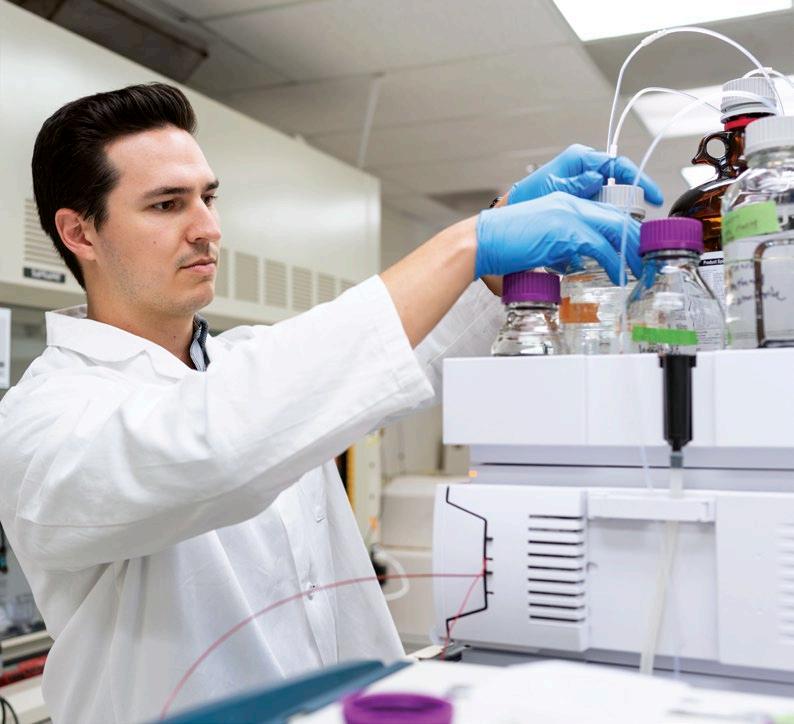
The USC Mann School’s most prestigious student award, the Krown Fellowship includes funding for Ebright’s studies to identify potential drug targets for Alzheimer’s disease and find correlations between neuroinflammation and cognitive performance. The Krown Fellowship provides an award of $10,000 for salary and discretionary research funds.
In 2022, Ebright served as first author of a pioneering study into the mechanisms of brain inflammation in Alzheimer’s disease that was published in Alzheimer’s Research & Therapy. The research resulted from a collaboration between the laboratory of Stan Louie, professor of clinical pharmacy and director of USC Mann’s Clinical and Experimental Therapeutics Program; Hussein Yassine, director of the Center for Personalized Brain Health at Keck School of Medicine of USC; and scientists at Rush University Medical Center in Chicago.
After an initial study of 42 human brains using lipidomics—a challenging approach for graduate students, according to Louie—Ebright is now finishing the second part of the study. Funded by the National Institute on Aging, Ebright and his colleagues are using samples collected from more than 200 patients. The project is in preclinical trials.
Finding Answers
Ebright says the team approaches the project from different angles to investigate how supplementation with omega-3 fatty acids, like docosahexaenoic acid, may help slow or stop cognitive decline in early-stage Alzheimer’s patients. And for people already past that point, the researchers are looking for ways to alleviate some of the neuroinflammation that causes symptoms.
Since Ebright’s work relies heavily on mass spectrometry, the USC Mann’s Multi-omics Mass Spectrometry Core is a frequent destination. Other destinations have been much farther away. With funding from the school, Ebright has journeyed to conferences across the U.S. and Europe to present findings and network with fellow scientists.
Ebright’s tenacity and innovative spirit play a big role in his research success, Louie says. “Brandon is an analytically outstanding student scientist,” he adds. “He has the outstanding potential to become a transformative scientist.”
A family history of Parkinson’s and Alzheimer’s disease spurs PhD student Brandon Ebright to pursue more effective therapies for neurodegenerative diseases.
29 RESULTS SPRING 2024
STUDENT SPOTLIGHT:
TONY YU
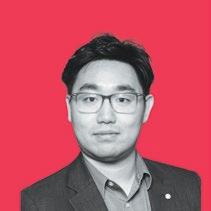
Tony Yu attended his first Professional Society for Health Economics and Outcomes Research (ISPOR) conference in 2018. That event, in which he has participated annually ever since, was his introduction to the world of health economics. It was a defining moment for Yu, who says the conference set the direction for his academic and professional pursuits.
Now a PhD candidate in health economics at USC Mann with a focus on health economics and outcomes research (HEOR), Yu is also a HEOR doctoral fellow at the pharmaceutical company AbbVie.
His time at USC Mann marks a culmination of training that has taken many healthrelated paths. Yu received his Master of Public Health from Yale in 2019. Before that, he studied biology and neuroscience at Washington University in St. Louis.
After completing most of his PhD coursework, Yu decided to pursue a challenging dual-degree track. He is the first-ever student at USC Mann to garner a master’s in biopharmaceutical marketing while also studying for a PhD. He earned the MS in 2023 and expects to finish his PhD this year. Yu credits Ken Wong, director of the school’s Division of Healthcare and Biopharmaceutical Business, with helping secure that chosen pathway.
“By blending the MS in biopharmaceutical marketing with a PhD in health economics, Tony is something of a pioneer,” Wong says. “But given his curiosity, drive and talent, as well as his remarkable dedication and foresight, I never had any doubt that he would succeed in both. I know he will fuse the two disciplines for great success in his future career.”
Academic freedom has been a consistent theme throughout his time at USC Mann,
Yu notes. During his first two years as a PhD student, the school enabled him to conduct original research rather than being a teaching assistant. And instead of getting assigned to just one faculty member, Yu collaborated with numerous professors, as well as researchers from outside USC.
In the MS program, Yu led an Enterprise Team Project—a practicum providing students with real-world experience by working with actual biotechnology and pharmaceutical companies. The team aided a rare disease company on its medication that had failed to receive a positive response from the Institute for Clinical and Economic Review (ICER), an independent nonprofit that assesses the value of new therapeutics. With his peers, Yu explored how the ICER framework may pose a disadvantage to rare disease drugs, inadvertently blocking patients from accessing vital new treatments. He traveled to the 2023 International Pharmaceutical Federation World Congress in Brisbane, Australia, to present the team’s findings.
Yu notes that USC Mann prepared him well for the opportunity. “My classes in both the master’s and PhD programs really emphasize presentation skills,” he says. “I definitely did a lot more presentations than I was used to. And through that, I feel more confident before audiences.”
After adding his PhD to his master’s, Yu plans to enter the pharmaceutical or consulting industry. Whatever form his next path takes, he will keep promoting evidence-based research to better understand the value of innovative therapies— and to help ensure that patients have access to the right drugs at a reasonable cost.
30 USC MANN SCHOOL STUDENTS
Yu is the first USC Mann student to pursue both an MS in biopharmaceutical marketing and a PhD in health economics at the same time.
Celebrating Black History Month
Hundreds of students, faculty, staff and community members gathered for the first Black History Month Block Party at Pappas Quad on the Health Sciences Campus. Held February 29, the occasion was organized by USC Mann’s Black Pharmacy Society, including PhD students Michelle Kalu, PharmD ’22, and Atham Ali. Its festivities featured music, dance, food, prizes and offerings by local Black-owned businesses.

The block party was produced with support from USC Mann, the Keck School of Medicine of USC Office of Diversity and Inclusion, the USC Chan Division of Occupational Science and Occupational Therapy, and USC Graduate Student Government.
“This sets an amazing precedent for future collaborations and shows the USC community truly cares about supporting Black and Pan-African communities— within and outside of the school,” Kalu says of the event.

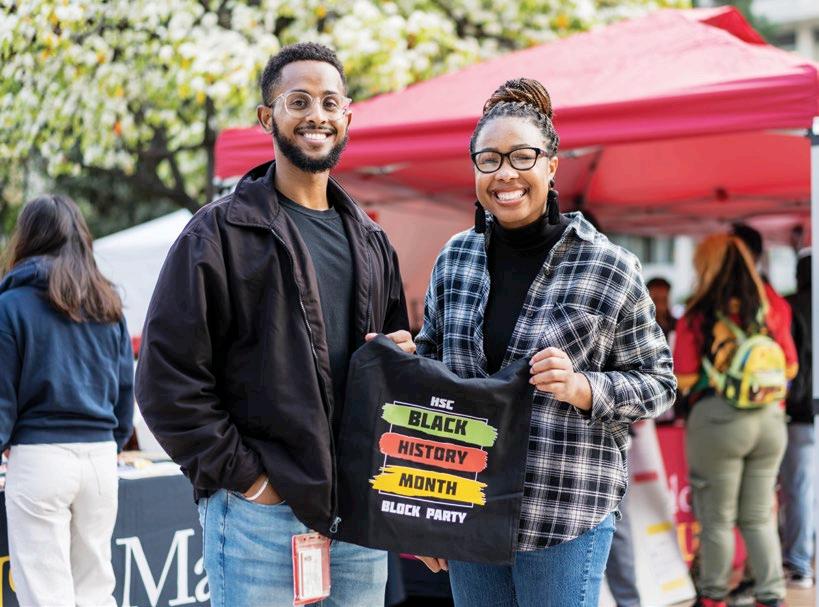
New Course Charts Vaccines and Biologics Development
The Mann School has created a course enabling undergraduates to explore how vaccines and other biopharmaceutical products are researched, designed and used to prevent disease. The course, BPSI 408: Biologics and Vaccines, is co-taught by Hovhannes J. Gukasyan—director of the MS in Drug Development program—and Assistant Professor Amanda M. Burkhardt. Under their mentorship, students synthesize and present findings from primary research articles on vaccines and biologics.
Launched in the spring 2024 semester, the course also features guest speakers such as John Geigert, president of BioPharmaceutical Quality Solutions, and Peter J. O’Brien, owner of StageGate Consulting, whose previous experience includes roles at Pfizer and Eli Lilly. “One of the unique features of this class is that it’s entirely pragmatic in content,” Gukasyan says.
31 RESULTS SPRING 2024
Top left and right: The festivities included dance performances and featured work by local artists; Bottom: PhD students Atham Ali and Michelle Kalu
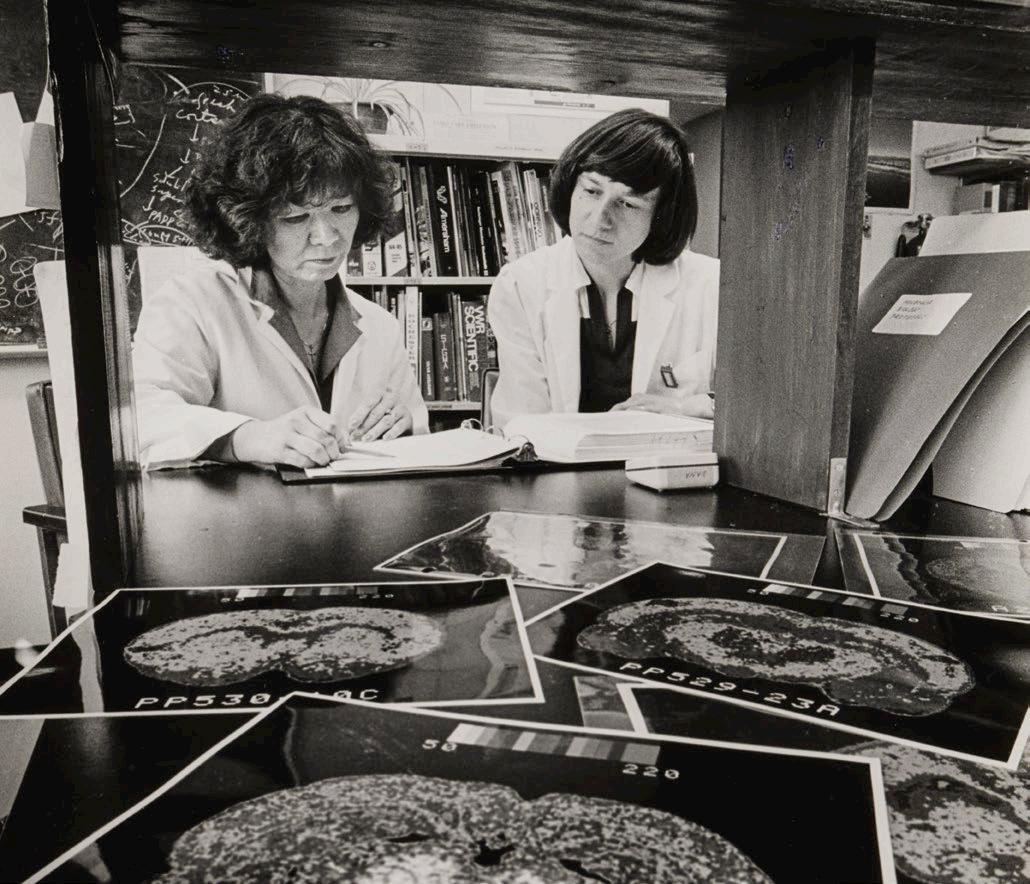
PHOTO SHOP
University Professor Jean Shih—the Boyd and Elsie Welin Professor of Pharmaceutical Sciences—will retire later this year after a distinguished career at USC Mann that spanned five decades. Shown above (left) in her lab in the 1980s, Shih is the founding director of the Center for USC–Taiwan Translational Research. Her numerous honors include two Research Scientist Awards and two MERIT awards from the National Institutes of Health, each providing 10-year support to investigators whose research competence and productivity are distinctly superior and who are likely to continue to perform in an outstanding manner. The MERIT award is given to the top 1% of investigators in the country.
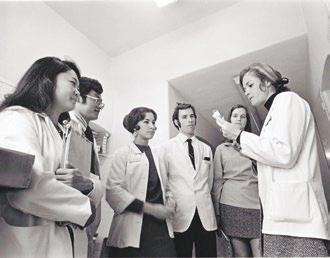
Reader responses to the fall 2023 Photo Shop
“I believe that the young lady on the far right is Vikki O’Toole and the student, fourth to the left of her, is Ronnie Yung.”
Joe Benitez, PharmD ’73
“I think I see Dan Kenny and Vickie Quinlivan. Fifty-two years is a long time ago.”
David Urstein, PharmD ’71
32 USC MANN SCHOOL
ENHANCING STUDENTS’ FUTURES
Providing scholarship and fellowship support to USC Mann students helps the school attract and train new generations of leaders who will change the face of pharmacy and pharmaceutical sciences.
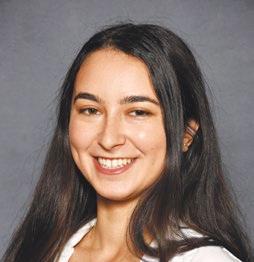
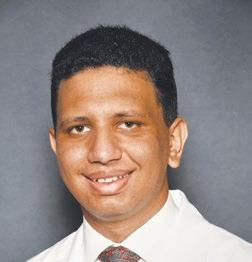
I feel part of the Trojan Family and I am so grateful to have the support of alumni mentors, professors and faculty. I feel very supported at USC.”
Shannon Lalezari, PharmD Class of 2026
Thank you so much for making it possible for me and for so many others to attend USC Mann, for supporting our journey and for allowing us to develop into the professionals we are meant to be.”
Mark Hanin, PharmD Class of 2026
Support USC Mann students and invest in their future. Make a gift online at mann.usc.edu/alumni
USC Mann School of Pharmacy and Pharmaceutical Sciences
Health Sciences Campus
University of Southern California 1985 Zonal Avenue Los Angeles, CA 90089-9121 mann.usc.edu

STAY IN TOUCH! Share news, update contact info and follow us on social media.
Nonprofit Organization US Postage Paid University of Southern California
Richard Dang, Kari Franson, Ying Wang and Brian Ma represented the USC Mann School at the annual meeting of the Big Ten Academic Alliance in greater Chicago in January. USC will officially join the Big Ten in August 2024.





 Vassilios Papadopoulos, DPharm, PhD, DSc (hon) Dean, USC Mann School
John Stauffer Decanal Chair in Pharmaceutical Sciences
Vassilios Papadopoulos, DPharm, PhD, DSc (hon) Dean, USC Mann School
John Stauffer Decanal Chair in Pharmaceutical Sciences

































































